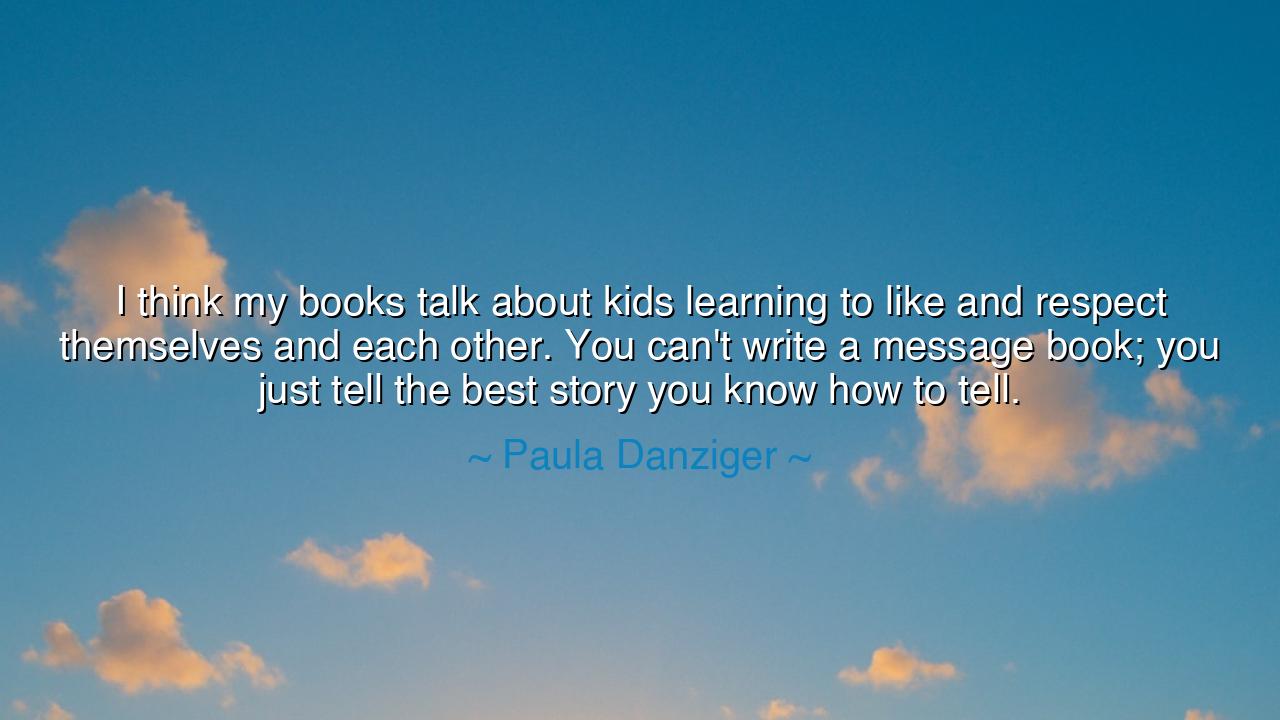
I think my books talk about kids learning to like and respect
I think my books talk about kids learning to like and respect themselves and each other. You can't write a message book; you just tell the best story you know how to tell.






Hear now the words of Paula Danziger, who spoke with the wisdom of one who carried stories in her heart: “I think my books talk about kids learning to like and respect themselves and each other. You can't write a message book; you just tell the best story you know how to tell.” Though these words may appear simple, they shine with the brilliance of ancient truth. For she teaches us that the deepest lessons are not carved into stone with commands, but whispered through the flow of story, where hearts are opened, and the soul is gently led toward light.
Danziger speaks first of children learning to like and respect themselves. This is no small task, for even the youngest among us are often burdened with doubt, comparison, and the shadows of judgment. To teach a child to love their own being is to give them armor against despair and cruelty. And to teach them respect for each other is to plant in them the seeds of community, compassion, and peace. Her craft, then, is not a hammer of doctrine, but a mirror held up to the spirit, allowing each child to see their worth reflected through the tale.
She warns us, however, against the heavy hand of the message book. The ancients, too, knew this danger. A parable forced too harshly upon the listener closes the ear and hardens the heart. But a story told with sincerity, with characters who live and breathe, carries within it a truth more powerful than any commandment. It is as Aesop taught, not by sermon, but by the fable of fox and crow, lion and mouse. Through the gentle path of narrative, wisdom seeps into the heart without resistance.
Consider the life of Harriet Beecher Stowe, who wrote Uncle Tom’s Cabin. She did not write it as a proclamation of law, nor a decree of politics. She wrote the story of suffering, of families torn, of humanity denied. And it was through the power of storytelling, not the preaching of a manifesto, that the hearts of millions were stirred to see slavery’s cruelty. President Lincoln is said to have greeted her as the woman who wrote the book that started the great war. Such is the strength of story—subtle in form, but mighty in consequence.
The emotional heart of Danziger’s words lies in her devotion to telling the best story you know how to tell. This is the path of authenticity. For the tale must first move the teller, must first rise from the depths of their own lived truth, before it can kindle fire in the listener. The ancients knew this, for Homer sang not of abstract lessons but of Odysseus and Achilles, and through their struggles, the world learned of courage, cunning, pride, and fate.
The lesson, beloved seeker, is this: Do not force your wisdom upon others as if you were pouring wine into a vessel too small to hold it. Instead, live your truth, tell your story, and let the wisdom rest within the folds of your words. Those who listen will take from it what their hearts are ready to receive. True teaching does not command—it awakens.
What then shall you do? First, honor your own story—know it, cherish it, and do not be ashamed of its flaws, for they are the scars that shape its power. Second, listen to the stories of others, for respect grows when we recognize the humanity in one another. Third, when you teach, whether by word or by example, do so gently, allowing others to find the lesson for themselves.
And remember always: the greatest truths are not thundered from the mountaintop, but carried in the voice of a tale told with love. Like Paula Danziger, tell the best story you know, and through it, may others learn to respect themselves, and in turn, each other. In this way, your life itself becomes the message, shining brighter than any book of rules.






AAdministratorAdministrator
Welcome, honored guests. Please leave a comment, we will respond soon